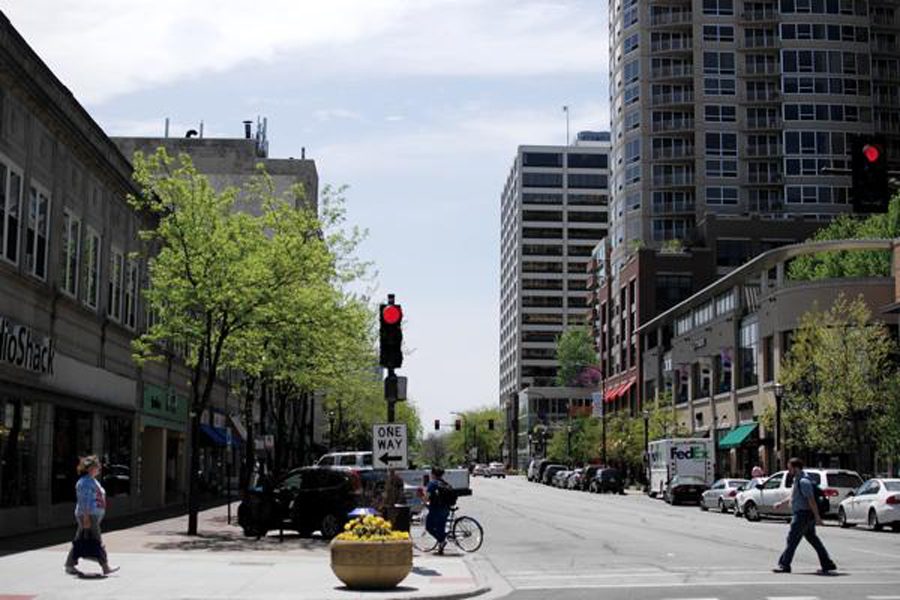Why Evanston property assessments have gone up
Daily file photo by Skylar Zhang/Daily Senior Staffer
Downtown Evanston. Many commercial property owners are worried that the increase in property values will correlate to a significant increase in their 2020 tax bill, which could potentially drive small businesses out of the city.
April 10, 2019
Both residential and commercial property values have increased in the recent reassessment period, causing many residents and commercial property owners to worry that their 2020 tax bill will increase.
Cook County Assessor Fritz Kaegi completed the assessment for Evanston, along with New Trier Township and Norwood Park Township, for the first time this reassessment period, which comes every three years. The median percentage of assessed Evanston residential property values increased by 9 percent since 2016.
In a response to residents’ fears of future financial uncertainty, Scott Smith, the chief communications officer of the Cook County Assessor’s Office, said the assessor’s office is striving to publicize evaluation methods and be transparent with residents by holding public meetings — which the office has not done in the past.
Smith said residential assessments generally rise with increases in market value. The residential assessments were up around 25 percent, which corresponds to a 23.5 percent increase in market value, Smith said.
“The problem with doing triennial assessments, we only do this part of the county once every three years,” Smith said. “So you’ve got three years of market forces that are happening between the last time you got an assessment notice from us and now. But you look at the average increase in market value, the assessments are roughly going up the same amount.”
Another explanation for the increase of property values could be the change in capitalization rates, or the ratio of income produced by a piece of property and its original price, which is used to determine a property’s value.
Small variations in the cap rate could significantly change the property’s value; Smith said there were errors in determining cap rates in the previous assessment.
“The capitalization rates we used the last time Evanston was assessed were out of sync with industry standards,” Smith said.
Assessors looked at comparable properties across the country that had cap rates that were far lower than the rates the office had used previously, he said. To assess 2019 commercial property values, Smith said the assessor’s office had to come up with new cap rates. He added that the rates used by previous assessors were wrong across all industries when comparing the Evanston business district to other similarly-sized districts across the country.
“We are not sure why they used those numbers,” Smith said. “We are not sure what decisions went into making those cap rates…Our rates are closer to what was used for average cap rates coming out of other data sources than it was in 2016.”
A joint investigation by ProPublica and the Chicago Tribune found that the last Cook County assessor, Joseph Berrios, used error-ridden commercial and industrial property assessments that punished property owners and benefited lawyers, creating inequity and hurting small businesses.
According to the 2019 commercial property assessment report, 2019 cap rates decreased for all types of commercial properties. The cap rates for apartments decreased to 6 percent from 11.95 percent in 2016, reflecting the most significant decrease of all properties. The rates of commercial, industrial, office and restaurant properties decreased as well.
Such changes in cap rates reflect the variations of increases in values of the property groups.
According to the 2019 assessment report, the average value of all commercial assessments increased since the last assessment in 2016. The average assessed value of apartments increased 281 percent, partly reflecting new construction in the city. Commercial and retail assessments increased 92 percent while offices and industrial assessments increased 71 and 46 percent, respectively.
Many commercial property owners are worried that the increase in property values will lead to a significant increase in their 2020 tax bill, worrying small business owners that they could be driven out of the city. Property owners expressed their concerns at a Monday public meeting at the Evanston Public Library.
However, Smith said the work of the new assessor’s’ office is coming closer to assessing property values more accurately, although mass appraisals like this one have a tendency to cause discrepancies. Smith said that through mass appraisal, the assessors are looking at “broad classes,” so individual assessments will need to be made in the appeals process to ensure accuracy.
However, he emphasized the work done by the assessors this year is “a lot closer to being right than it was in the past.”
“One of the challenges of mass appraisal is you are trying to take broad property classes and property characteristics and apply them broadly to multiple kinds of properties,” Smith said. “But everybody’s house is a little different and the average homeowner, property owner knows their property better than we do. We’re hoping to continue working with folks to get that data, to get the information correctly.”
Appeals for Evanston property owners are due April 15.
Are you worried that your recent property value assessment will affect your ability to afford your next tax bill? If so, we would like to hear from you at [email protected].
Email: [email protected]
Twitter: @cassidyw_
Related Stories:
– Evanston commercial property assessment increases property owners’ worry
– Group releases report on unequal Cook County property assessments


